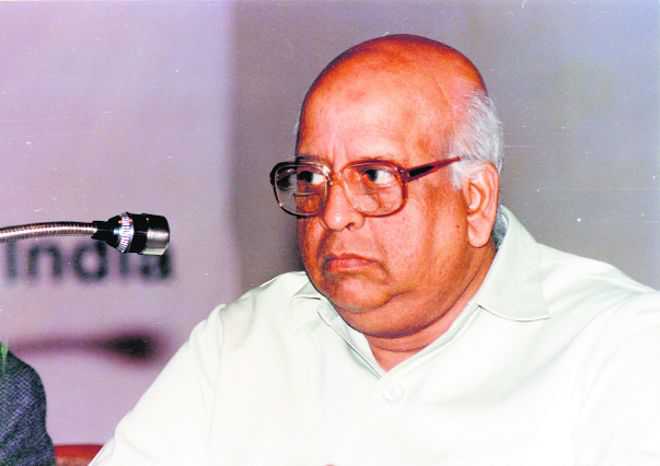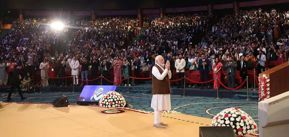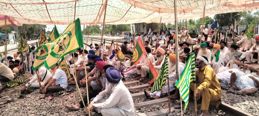
Tough guy: With his integrity and sense of purpose, TN Seshan established how legitimate power could be exercised for deepening our democracy for public good.
Amitabha Bhattacharya
Former Bureaucrat
Four eminent civil servants, each contributing in his own way to the efforts of nation-building, passed away last week, coincidentally, within a period of three days. Three of them — TN Seshan, PS Krishnan and S Ramesh — belonged to the Indian Administrative Service (IAS) while IMG Khan was from the Indian Postal Service. Public servants are not normally extolled as heroes and the ‘death of a bureaucrat’ rarely makes a wave.
But expectedly, Seshan’s demise has been nationally mourned with one newspaper editorial ranking him as a reformer alongside Sukumar Sen of the ICS who conducted India’s first General Election, introducing symbols for parties and Independent candidates. Krishnan’s death caused a sense of deep loss amongst his colleagues and, more importantly, the underprivileged categories of people for whose cause he had devoted his whole life. Ramesh and Khan are remembered for different reasons.
TN Seshan
A 1955 batch, Tamil Nadu cadre IAS officer, Seshan became an iconic figure, though within the bureaucracy, he was liked and disliked, almost in equal measure. Known for his high-handed approach, his manifest brilliance, oratorical skill, integrity and sense of purpose placed him in an exalted position in public eye. He visibly established how legitimate power could be exercised for deepening our democracy for public good.
While addressing the civil service probationers at the Lal Bahadur Shastri National Academy of Administration, Mussoorie, I recall, how he used to enthral them, narrating his myriad experiences at the district level. One favourite was the way he, as a District Collector, made Sheikh Abdullah, then interned in Madurai district, change his mind from undertaking a fast. Another related to the way he punished the villagers who had set on fire a police jeep with personnel inside during the days of the anti-Hindi agitation. He wanted to teach the errant villagers a lesson that their heinous act would not go unpunished.
While Seshan’s role as a Chief Election Commissioner was folklore, his stint as Secretary, Environment and Forests, Government of India, was equally memorable. He was the main force behind the Environment Protection Act, 1986 and other far-reaching initiatives in a new ministry. Like the Election Commission, the Environment Ministry had also its watershed years during his tenure.
But his seminal contribution notwithstanding, Seshan was not popular amongst the officials, for he often revelled in being an ‘aggressive, abrasive’, tough guy. However, my brief interaction gave me the impression that he was a clear-headed, no-nonsense and compassionate civil servant who was often misunderstood because of his arrogant exterior.
No wonder, as per his own account, he was transferred a couple of times in the Madras secretariat on one day! When threatened to be posted to Kanyakumari, he replied he would have enough time to meditate there with thousands of miles of uninterrupted sea ahead! However, his political ambition, post retirement, did not add any glory to his spectacular career.
PS Krishnan
Krishnan was of the 1956 batch of Andhra Pradesh cadre. He was not controversial. His record in the state and later as a secretary in the Union Ministry of Welfare, is testimony to what a conscientious bureaucrat can achieve to ameliorate the conditions of millions of men and women belonging to the SCs, STs and other socially and educationally backward classes (SEdBCs). He was a professional to the core and never strayed from his svadharma.
While working for reservation to SEdBCs among the Muslims in Andhra Pradesh — a move that had earlier been invalidated by the High Court — I observed the real authority that a committed officer can command, purely by virtue of dedication and scholarship. Krishnan was in total control, from drafting reports to preparing briefs in defence of the executive/legislative action in the High Court and Supreme Court. Just with the help of an assistant, he could single-handedly draft a piece of legislation, even at an advanced age.
Besides, he knew how to softly but firmly convince the political executive to work for social justice. His enormous personal ability, his sense of history and his conviction about the state intervention needed to make a decisive difference in an unjust society — combined to make Krishnan an exceptional public servant. His deft implementation of the Mandal committee recommendations and his book Social exclusion and justice in India will be remembered by a grateful nation.
S Ramesh
S Ramesh from Tamil Nadu, topper of the 1959 batch, opted to serve in the Uttar Pradesh cadre. A very private person, not interested in the glamorous side of the IAS, he served UP well in different capacities and joined the Centre as a joint secretary in the Power Ministry.
Thereafter, he took voluntary retirement and joined Tata Energy Research Institute (TERI) in Delhi. With a PhD from IIT, Kanpur, he made a quiet mark in the energy sector. He settled and passed away in Ranikhet, where he had begun his career as a sub-divisional magistrate, loved by and identifying himself with the local Kumaoni people he had had the opportunity to serve. As a junior colleague of his observed, the IAS rested lightly on the shoulders of this remarkable man.
IMG Khan
IMG Khan was of the 1970 batch. He rose to be the secretary in the Department of Posts and later served as a Member of the UPSC. As a senior faculty in the late eighties at the Mussoorie Academy, I observed his cheerful interaction with the probationers and compatriots. He was loved and respected for his amazing ability to motivate the younger generation for public causes.
Though he never gave the impression of being a workaholic, he proved to be an astute administrator, ideating innovative initiatives wherever he worked. For his natural charm, leadership quality and subject matter knowledge, he is counted as one of the finest secretaries the department ever had. Khan was grace personified.
All these four men joined the civil services inspired by an ideal. They came from diverse backgrounds, differing in temperament and personality. And all of them enriched the tapestry of our administrative system in the highest traditions of service.



























